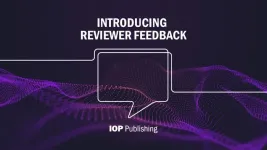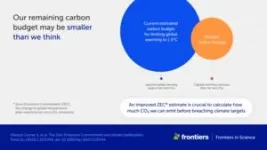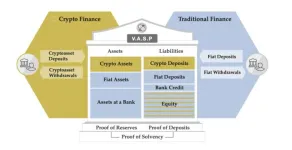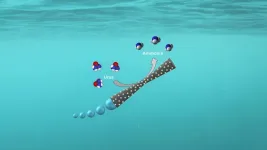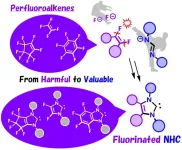(Press-News.org) IOP Publishing (IOPP) is now offering peer reviewers feedback on their reviewer reports to enhance the quality of peer review and to strengthen best practice in the physical sciences.
IOPP have rolled out the new programme on an opt-in basis across all its proprietary journals. Where reviewers opt-in for feedback on their report, IOPP will share a numerical evaluation of how useful the report was to the in-house editors on a scale of 1 to 5, with 5 being outstanding and 1 indicating that the report is not suitable to inform a decision. Reviewers can then see constructive information about the structure and usefulness of the reports which explains the evaluation.
A survey which included insights from over 1,200 researchers who have reviewed, or been invited to review, with IOPP shows that feedback on their reviewer reports would improve their peer review experience, whether that is being notified about the final decision on the paper or receiving information about the quality of their report. In particular, the results show that feedback on the quality of reports is most valued by early career researchers, where this feedback can be invaluable in developing their research skills.
The launch follows a successful trial of the programme across three IOP Publishing journals, including Engineering Research Express, Environmental Research Letters, and Plasma Physics and Controlled Fusion. Over 85% of reviewers involved in the trial indicated that receiving feedback on their report was useful or very useful. Over 2,700 reviewers have already opted in to receive feedback on their reports since IOPP extended the programme to all its proprietary journals in September.
Laura Feetham, Reviewer Engagement Manager at IOPP, says: "The work of our peer review experts is crucial to the advancement of science, and yet reviewers rarely (if ever) receive feedback from editors about the quality of their reports and to what extent they influenced the editorial decision. We wanted to change this on behalf of our peer review communities. Now our reviewers can opt-in to be given an honest evaluation of their report, straight from the editor. Our hope is that this will improve transparency in the peer review system and help early-career researchers to build their peer review skillset.”
The introduction of reviewer feedback is the latest in a series of peer review innovations at IOPP, which include a new co-review policy, and the Peer Review Excellence programme. Researchers interested in becoming part of the IOPP community of reviewers can find out more here.
IOP Publishing (IOPP) is now offering peer reviewers feedback on their reviewer reports to enhance the quality of peer review and to strengthen best practice in the physical sciences.
IOPP have rolled out the new programme on an opt-in basis across all its proprietary journals. Where reviewers opt-in for feedback on their report, IOPP will share a numerical evaluation of how useful the report was to the in-house editors on a scale of 1 to 5, with 5 being outstanding and 1 indicating that the report is not suitable to inform a decision. Reviewers can then see constructive information about the structure and usefulness of the reports which explains the evaluation.
A survey which included insights from over 1,200 researchers who have reviewed, or been invited to review, with IOPP shows that feedback on their reviewer reports would improve their peer review experience, whether that is being notified about the final decision on the paper or receiving information about the quality of their report. In particular, the results show that feedback on the quality of reports is most valued by early career researchers, where this feedback can be invaluable in developing their research skills.
The launch follows a successful trial of the programme across three IOP Publishing journals, including Engineering Research Express, Environmental Research Letters, and Plasma Physics and Controlled Fusion. Over 85% of reviewers involved in the trial indicated that receiving feedback on their report was useful or very useful. Over 2,700 reviewers have already opted in to receive feedback on their reports since IOPP extended the programme to all its proprietary journals in September.
Laura Feetham, Reviewer Engagement Manager at IOPP, says: "The work of our peer review experts is crucial to the advancement of science, and yet reviewers rarely (if ever) receive feedback from editors about the quality of their reports and to what extent they influenced the editorial decision. We wanted to change this on behalf of our peer review communities. Now our reviewers can opt-in to be given an honest evaluation of their report, straight from the editor. Our hope is that this will improve transparency in the peer review system and help early-career researchers to build their peer review skillset.”
The introduction of reviewer feedback is the latest in a series of peer review innovations at IOPP, which include a new co-review policy, and the Peer Review Excellence programme. Researchers interested in becoming part of the IOPP community of reviewers can find out more here.
END
IOP Publishing unveils industry-leading feedback system for reviewers
2023-11-14
ELSE PRESS RELEASES FROM THIS DATE:
Assessing the solvency of virtual asset service providers: Are current standards sufficient?
2023-11-14
The collapse of FTX clearly highlights the importance of being able to evaluate the solvency of cryptocurrency exchanges. Currently, this is only possible to a limited extent. That's why researchers from the Complexity Science Hub (CSH), in collaboration with the Financial Market Authority (FMA) and the Austrian National Bank (OeNB), are now proposing a new approach.
Recently, a New York jury found Sam Bankman-Fried, the founder of the cryptocurrency exchange FTX, guilty of money laundering and fraud, among other charges. FTX was one of the largest trading platforms for crypto-assets and was valued at $32 billion before unexpectedly filing for insolvency in November ...
States with legalized medical marijuana see decline in nonmedical opioid use
2023-11-14
Medical cannabis legalization is associated with a decrease in the frequency of nonmedical prescription opioid use, according to a Rutgers study.
The study, published in the International Journal of Mental Health and Addiction, examined data from a nationally representative survey of adults who reported nonmedical prescription opioid use – or using prescription medications without a prescription or in a manner other than prescribed.
According to the study, when states implement medical cannabis laws, there is ...
Cancer stem cells trigger macrophage aging
2023-11-14
Cancer stem cells cause the aging of macrophages in mice with healthy immune systems, creating conditions for the formation of tumors.
Cancerous tumors consist of a mixture of cells, the most important of which are cancer stem cells. These cells are capable of establishing new cancerous tumors by evading the immune response. Research has focused on identifying biomarkers for cancer stem cells and developing therapies that target these cells. Unfortunately, candidate drugs developed from these efforts have so far not been very effective in clinical trials.
A research team led by Associate Professor Haruka Wada ...
New water treatment method can generate green energy
2023-11-14
Researchers from ICIQ in Spain have designed micromotors that move around on their own to purify wastewater. The process creates ammonia, which can serve as a green energy source. Now, an AI method developed at the University of Gothenburg will be used to tune the motors to achieve the best possible results.
Micromotors have emerged as a promising tool for environmental remediation, largely due to their ability to autonomously navigate and perform specific tasks on a microscale. The micromotor is comprised of a tube made of silicon and manganese dioxide in which chemical reactions cause the release of bubbles from one end. These bubbles ...
CPRIT recognized by TAMEST with Kay Bailey Hutchison Distinguished Service Award
2023-11-14
AUSTIN – TAMEST (Texas Academy of Medicine, Engineering, Science and Technology) is pleased to announce the Cancer Prevention and Research Institute of Texas (CPRIT) as the recipient of the Kay Bailey Hutchison Distinguished Service Award.
TAMEST is recognizing CPRIT for their work improving the lives of Texans, advancing cancer research and prevention, and recruiting National Academy members to Texas. CPRIT’s success in attracting top-tier cancer scientists and companies to the state ...
Converting PFAS “forever chemicals” into valuable compounds
2023-11-14
Osaka, Japan – Commonly known as “forever chemicals,” PFAS are notorious for persisting in the environment and in our bodies. Osaka Metropolitan University chemists may put an end to the “forever” life of PFAS with their simple yet innovative technique that converts these harmful substances into valuable compounds.
A research group led by Professor Masato Ohashi and Assistant Professor Kenichi Michigami of the Graduate School of Science at Osaka Metropolitan University has successfully synthesized ligands called fluorine-decorated ...
Women with depression have 20% lower taurine concentration in the hippocampus
2023-11-14
For the first time, a research team in Korea has discovered there is a significant relationship between depression and the taurine concentration in the hippocampus, an area of the brain responsible for memory and learning functions. This discovery provides the opportunity to publicize the role and importance of taurine in future prevention, diagnosis, and treatment of depression.
Using ultra-high magnetic field 7T human MRI (7T MRI), researchers (Drs. Youngkyu Song, Jee-Hyun Cho and Chaejoon Cheong) in the Korea Basic Science Institute (KBSI, President Seong-Kwang Yang) Biochemical Analysis Team have confirmed ...
Genetic testing could greatly benefit patients with depression, save health system millions
2023-11-14
A special kind of genetic test that helps determine the best antidepressant for patients with moderate-to-severe depression could generate substantive health system savings and greatly improve patient outcomes, according to new research from the University of British Columbia.
The study, published today in CMAJ, shows that in B.C. alone, implementing pharmacogenomic testing could save the provincial public health system an estimated $956 million over 20 years.
“Pharmacogenomic testing aims to match patients with medications that are more likely to be effective and cause less side effects, based ...
Geese ‘keep calm and carry on’ after deaths in the flock
2023-11-14
Canada geese strengthen existing friendships and forge a few new connections after losing close associates from their flock, new research shows.
University of Exeter scientists observed flocks of Canada geese before and after a population-management cull in which about 20% of the birds were killed.
In such a situation, some animals species increase “social connectivity” – mixing with many new individuals – which can increase the transmission of infectious diseases.
But the geese in the study responded by strengthening existing relationships, only adding enough new associations to replace those they had lost.
“Our findings shows that Canada geese are very ...
Using eclipses to calculate the transparency of Saturn’s rings
2023-11-14
A Lancaster University PhD student has measured the optical depth of Saturn’s rings using a new method based on how much sunlight reached the Cassini spacecraft while it was in the shadow of the rings.
The optical depth is connected to the transparency of an object, and it shows how far light can travel through that object before it gets absorbed or scattered.
The research, led by Lancaster University in collaboration with the Swedish Institute of Space Physics, is published in the Monthly Notices ...
